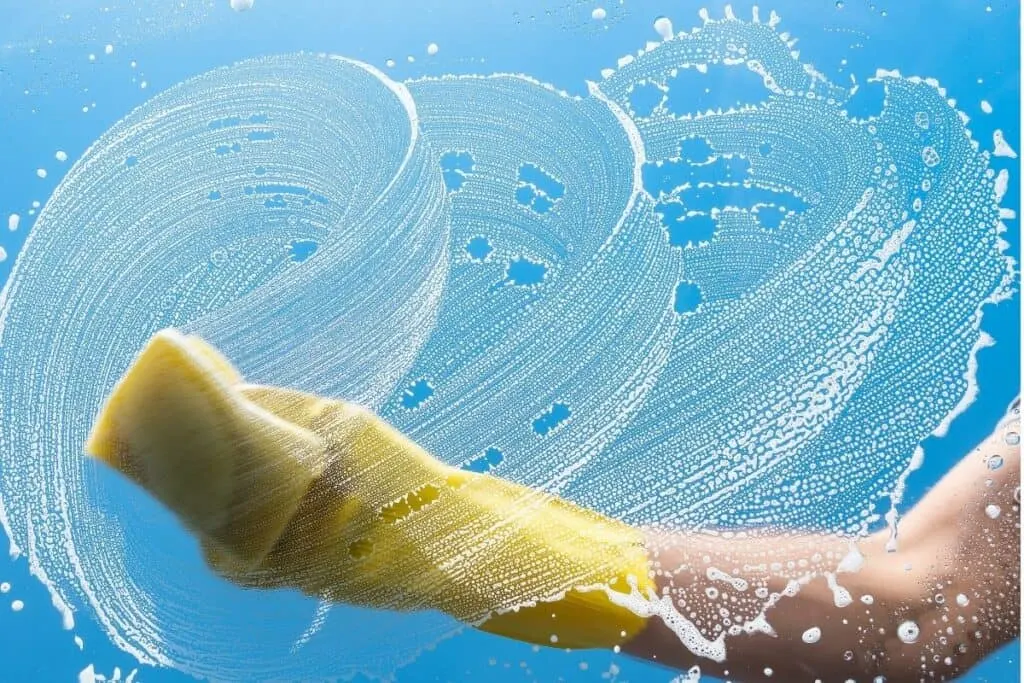Like most large cleaning tasks, window cleaning is not something I tend to look forward to. Whether you’re considering installing black windows or already have, I’m sure you’re wondering how cleaning them compares to cleaning the common white variety.
Black windows are no more difficult to clean than any other type of windows. Read on to learn all the tips and tricks!
Cleaning Black Windows Compared to White Windows
If you love the aesthetic of black windows, you may have one burning question in your mind: are black windows hard to keep clean compared to white windows?
Let’s take a look at the differences you may encounter and how to approach cleaning black windows.
Less Visible Dirt
Due to the dark nature of black windows, the visibility of dirt and grime is lower. This means you’ll be able to wait longer in between cleaning before it becomes noticeably dirty.
There is only one exception to this; during pollen season, the windows may show more build-up easier due to the contrast between the bright yellow pollen and the stark black windows.
The lower visibility can also work against you because if you use appearance to determine when it’s time to clean your windows, you may let the grime sit far longer before washing. This can make the cleaning process more difficult than it would be otherwise.

Color Fading
Over time, the color of black windows can fade from years of sun and environmental exposure.
The fading can give an appearance of dirtiness as your windows age. This isn’t wholly unique to black windows, though, as white windows have a tendency to gain a yellow or green hue after many years of exposure.
Abrasive Scratches
Any time you’re cleaning glass, it’s best to avoid abrasive cleaners so you don’t scuff the glass. This is especially true for black windows since abrasion or aggressive scrubbing can leave scratches in the black coating.
These scratches may be minor at first but add up with each cleaning and significantly impact your windows’ appearance.
Discoloration
Harsh chemicals cannot be used on black windows due to the possibility of discoloration from the cleaners.
This rules out things like bleach or ammonia-based cleaning solutions. As long as you understand this possible issue, the risk is quite low since very effective cleaning solutions are perfectly safe and won’t cause any unwanted discoloration.
Cleaning Materials to Avoid
There are many things to consider when cleaning windows of any kind, and black windows are no exception to this rule. Using the wrong cleaning materials, solutions, or methods can cause permanent damage to your lovely windows.
With black windows, you need to be wary of the usual things when cleaning windows, such as not scratching the glass or using chemicals that can ruin the sealant.
Your best bet is to avoid using the following common cleaning materials.
- Abrasive cleaning pads
- Bristle Brushes
- Scrapers or blades
- Steel Wool
- Abrasive cleaning powders or creams
- Bleach
- Ammonia
- Paint Thinners
- Acetone
- Spirits

What works well
Remove Loose Dirt
Use a vacuum cleaner to suction off any loose dirt and debris. This step ensures you’re not accidentally scratching your windows with dirt or twigs that could be built up between cleanings.
Suppose you don’t have access to a vacuum outdoors. In that case, you could alternately use a duster or compressed air to remove any debris.
Select Your Cleaner
Select your cleaning solution based on your specific needs. Depending on the type of black windows you have installed, you may be able to find a specialized cleaner from your window manufacturer.
Suppose such a cleaner is not available, or you don’t want to have a separate cleaner just for your windows.
In that case, you can make a simple, safe, and effective cleaner by combining warm water with distilled vinegar in about a 1 to 4 ratio.
Cleaning Supplies
Suppose you’ve chosen a do it yourself cleaning solution. In that case, it’s suggested you put it in a spray bottle to make applying the solution much easier. Other cleaners should have a sprayer or other mechanism to apply the solution to the windows.
Regardless of the solution you chose, you’ll need something gentle to wipe down the windows with. The best choices for this task are soft towels, microfiber cloths, or sponges.
If you decide to use a sponge, just make sure not to use a scrubber type of sponge as that could cause unnecessary scratching to your windows.
Easy Cleaning Routine
The best cleaning routine for your black windows starts by getting on a schedule. The optimal frequency would be twice a year; this ensures you don’t let the dirt build up on the windows for too long, which would make the task more difficult.
When it’s time to clean your windows, grab your vacuum or duster to remove any debris from the corners and window tracks. You’ll also use this time to clear out any spiders or other critters that have made the windows their home.
Apply your cleaning solution to the window and let it sit as directed on your instructions. If you’re using the DIY cleaner, it’s best to let it sit for 10-15 minutes to make sure it has time to loosen up the grime.
Wipe away the solution along with the dirt with a wet gentle cloth or sponge once the time has passed.
The final step is to use a clean, dry cloth to fully wipe any moisture from the windows to prevent any streaking. Depending on the type of windows used, you may want to buff your window frames with special products designed for that purpose.

Final Thoughts
Window cleaning can be tedious, but with these steps, you should be much more prepared. So, are black windows hard to keep clean?
The truth is, they aren’t any more difficult to keep clean than other types of windows.
A number of factors affect the appearance and cleanliness of windows, and black windows have some unique things to keep in mind.
The main takeaway is to clean your windows regularly and use gentle products to keep your windows looking their best for as long as possible.


